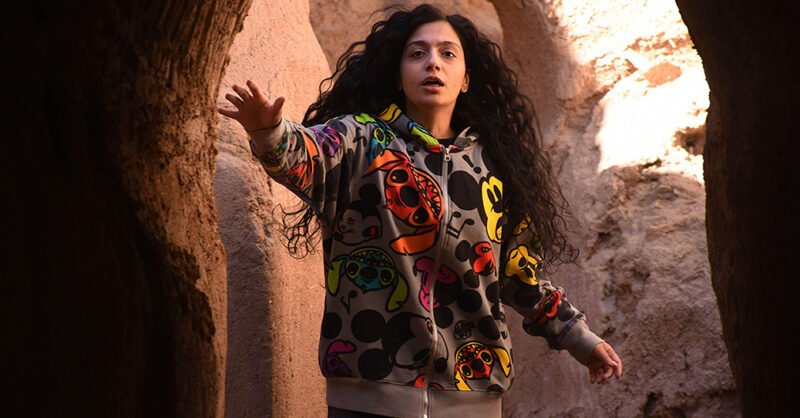
Awards season. For some Hollywood stars, such prizes are a vanity project. For some film-makers, though, they are necessary to survival.
The career of the Iranian director Mohammad Rasoulof has been largely sustained by prizes, awarded at festivals such as Cannes and Berlin, where his last film, There is No Evil, took the Golden Bear in 2020. After being feted at Cannes, this new film, The Seed of the Sacred Fig, is now up for Best International Feature Film at the Oscars – the submission coming from Germany, where the film was finished and Rasoulof now lives in exile.
Rasoulof’s eight films have not been shown in Iran, where he has been repeatedly arrested, interrogated and condemned, serving 11 months in the notorious Evin prison, including 65 days in solitary confinement. In April last year, he was sentenced to a further eight years’ imprisonment and banned from leaving the country. But he escaped, and appeared at Cannes for the film’s premiere, receiving a standing ovation.
Under pressure of censorship, other Iranian directors, including Rasoulof’s colleague Jafar Panahi, have resorted to oblique modes, such as allegory and sketchy autofiction. The Seed of the Sacred Fig, however, addresses tyranny and repression directly, linking the way they work within the family and the state. The film, made in secret, is
a full-scale production.
Iman (Missagah Zareh), a devout middle-aged lawyer, has just been promoted to investigating judge in the Revolutionary Court in Tehran (the court that has repeatedly condemned Rasoulof). His loyal wife Najmeh (Soheila Golestani) looks forward to the family being able to afford a bedroom each for their two girls, 21-year-old Rezvan (Mahsa Rostami) and teenage Sama (Setareh Maleki), both roles taken by actors older than their characters, since participation involved such risk.
Iman warns his family that all their conduct – their attitudes, their words, their clothes, where they go – must henceforth be irreproachable, so as not to put him at risk, either with his superiors or the enemies of the state. For his own protection, he has been issued with a handgun, a serious matter in Iran. But Iman soon discovers that his new job consists not of investigation but merely signing off on indictments – one after another – many of which call for the death penalty. Initially troubled, he soon complies, signing away hundreds of lives. This takes place during the wave of protests, in the name of Women, Life, Freedom, that erupted in 2022, sparked by the death in custody of 22-year-old Mahsa Amini, beaten by the religious morality police for not wearing the hijab correctly.
Najmeh gets her news from state-run television and condemns the protestors. But Rezvan and Sama watch the protests unfold in real time on their phones – and we, too, see real footage of the horrific beatings of girls at demonstrations. A friend of Rezvan’s, Sadaf (Niousha Akhshi), who has been shot in the face at a protest, seeks refuge in their apartment. At first indignant, Najmeh softens, picking the shotgun pellets out of her wounds.
Subscribe to The New Statesman today for only £1 per week
The family begins to fracture. Then, Iman’s gun disappears. Enraged, terrified, he subjects his family to the same harsh interrogations used by the state. When Iman is denounced on social media, they flee Tehran, heading for his remote birthplace. “Over there, we will become the family we were”, he believes.
The first two hours of this 168-minute film are an intimate, family drama, exceptionally well-acted (without hijabs, contrary to Iranian law), mostly filmed within the apartment and the interiors of cars. The last act takes a much more thriller-like turn, almost a horror film, the demented patriarch morphing into a version of Jack in The Shining (indeed, the ruined city, Kharanaq, where the final sequence plays out, is a maze).
Remarkably, Rasoulof has made a film not about his own situation, instead focusing on what participation in this system does to the oppressor (just as in There is No Evil, he exposed what capital punishment does to those required to perform it). The Seed of the Sacred Fig is not subtle, but it is nonetheless an immense achievement, revealing how different this revolt – the Jina Revolution – has been. Led by astonishingly courageous young women, who resist brute force with mobile phone footage, this is a new generation, demanding life.
Rasoulof was in Evin prison, watching these events unfold on social media as they happened, the idea for the film sparked by a conversation with a prison official consumed with self-disgust. From a man in his fifties, it’s a great act of recognition as well as of resistance.
“The Seed of the Sacred Fig” is in cinemas now
[See also: Vaping is seriously harmful to your vibe]

